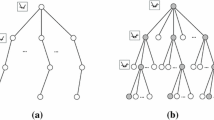Abstract
This paper proposes a new iterative discrete Latin hypercube sampling based method to maximize the objective function (OF) in production strategy optimization. This methodology adequately treats posterior frequency distributions of discrete random variables and maximizes non-necessarily monotonic objective functions within discontinuous search spaces and many local optimums. To validate the method, we used an exhaustive process with an net present value (NPV) proxy, as the objective function, to be maximized. Using as an application case, the benchmark UNISIM-I-D reservoir model, based on Namorado field, Campos basin, Brazil, the method successfully maximized the NPV in the intermediate phase of production strategy optimization, and even compared favorably with a well-established optimization methodology. Population based optimization using discrete Latin hypercube sampling best suited this methodology, with consistent convergence to global optimum, few OF evaluations and the simultaneous multiple numeric reservoir simulations runs. This easy to use, reliable methodology with low computational time costs is an interesting option for optimization methods in problems of production strategy design related to the oil industry.






Similar content being viewed by others
Abbreviations
- DECE:
-
Designed exploration stage and controlled evolution
- DLHC:
-
Discrete Latin hypercube sampling
- IDLHC:
-
Iterative discrete Latin hypercube sampling
- NPV:
-
Net present value
- OF:
-
Objective function
References
Rao SS (2009) Engineering optimization, 4th edn. Wiley, New York
Goldberg DE (1989) Genetic algorithms in search, optimization & machine learning. Addison Wesley, Boston
Eshelman LJ, Schaffer JD (1993) Real-coded genetic algorithm and interval-schemata. Found Genet Algorithms 2:187–202
Kirkpatrick S, Gelatt CD Jr, Vecchi MP (1983) Optimization by simulated annealing. Science 220(4598):671–680
Černý V (1985) Thermodynamical approach to the traveling salesman problem: an efficient simulation algorithm. J Optim Theory Appl 45:41–51
Kennedy J, Eberhart R (1995) Particle swarm optimization. In: Proceedings of IEEE international conference on neural networks, pp 1942–1948
Bergh FVD, Engelbrecht AP (2006) A study of particle swarm optimization particle trajectories. Inf Sci 176:937–971
Storn R, Price K (1997) Differential evolution—a simple and efficient heuristic for global optimization over continuous spaces. J Glob Optim 11:341–359
Das S, Suganthan PN (2011) Differential evolution: a survey of the state-of-the-art. IEEE Trans Evol Comput 15(1):4–31
Bittencourt AC, Horne RN (1997) Reservoir development and design optimization. In: SPE-38895-MS, SPE annual technical conference and exhibition, TX, USA
Schiozer DJ, Santos AAS, Drummond PS (2015) Integrated model based decision analysis in twelve steps applied to petroleum fields development and management. In: SPE 174370, Society of Petroleum Engineers, Europec 2015, Madrid, Spain
Yang C, Nghiem L, Card C, Bremeier M (2007) Reservoir model uncertainty quantification through computer-assisted history matching. In: SPE 109825, SPE annual technical conference and exhibition, CA, USA
Goda T, Sato K (2014) History matching with iterative Latin hypercube samplings and parameterization of reservoir heterogeneity. JPSE 114:61–73
Maschio C, Schiozer DJ (2016) Probabilistic history matching using discrete latin hypercube sampling and nonparametric density estimation. JPSE. Preprint
Goda T (2013) On the separability of multivariable functions. Preprint. arXiv:1301.5962v1 [math.NA]
Avansi GD, Schiozer DJ, Suslick SB, Risso FVA (2009) Assisted procedures for definition of production strategy and economic evaluation using proxy models. In: SPE 122298, SPE Europec/EAGE annual conference and exhibition, The Netherlands
Cai W, Ewing DJ, Ma L (2011) Investigation of temperature parallel simulated annealing for optimizing continuous functions with application to hyperspectral tomography. Appl Math Comput 217(12):5754–5767
Gaspar ATFS, Avansi GD, Santos AAS, Hohendorff Filho JCV, Schiozer DJ (2015) UNISIM-I-D: benchmark studies for oil field development and production strategy selection. Int J Model Simul Pet Ind 9:47–55
Acknowledgments
The authors are grateful for the support of the Center of Petroleum Studies (CEPETRO-UNICAMP/Brazil), the Department of Energy (DE-FEM-UNICAMP/Brazil), PETROBRAS S/A, Foundation CMG and Research Group in Reservoir Simulation and Management (UNISIM-UNICAMP/Brazil). In addition, special thanks to CMG for software licenses.
Author information
Authors and Affiliations
Corresponding author
Additional information
Technical Editor: Celso Kazuyuki Morooka.
Rights and permissions
About this article
Cite this article
von Hohendorff Filho, J.C., Maschio, C. & Schiozer, D.J. Production strategy optimization based on iterative discrete Latin hypercube. J Braz. Soc. Mech. Sci. Eng. 38, 2473–2480 (2016). https://doi.org/10.1007/s40430-016-0511-0
Received:
Accepted:
Published:
Issue Date:
DOI: https://doi.org/10.1007/s40430-016-0511-0



